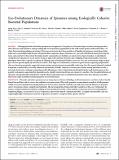Eco-Evolutionary Dynamics of Episomes among Ecologically Cohesive Bacterial Populations
Author(s)
Xue, Hong; Cordero Sanchez, Otto Xavier; Camas, Francisco M.; Trimble, William; Meyer, Folker; Guglielmini, Julien; Rocha, Eduardo P. C.; Polz, Martin F; ... Show more Show less
DownloadXue-2015-Eco-Evolutionary Dyn.pdf (2.050Mb)
PUBLISHER_CC
Publisher with Creative Commons License
Creative Commons Attribution
Terms of use
Metadata
Show full item recordAbstract
Although plasmids and other episomes are recognized as key players in horizontal gene transfer among microbes, their diversity and dynamics among ecologically structured host populations in the wild remain poorly understood. Here, we show that natural populations of marine Vibrionaceae bacteria host large numbers of families of episomes, consisting of plasmids and a surprisingly high fraction of plasmid-like temperate phages. Episomes are unevenly distributed among host populations, and contrary to the notion that high-density communities in biofilms act as hot spots of gene transfer, we identified a strong bias for episomes to occur in free-living as opposed to particle-attached cells. Mapping of episomal families onto host phylogeny shows that, with the exception of all phage and a few plasmid families, most are of recent evolutionary origin and appear to have spread rapidly by horizontal transfer. Such high eco-evolutionary turnover is particularly surprising for plasmids that are, based on previously suggested categorization, putatively nontransmissible, indicating that this type of plasmid is indeed frequently transferred by currently unknown mechanisms. Finally, analysis of recent gene transfer among plasmids reveals a network of extensive exchange connecting nearly all episomes. Genes functioning in plasmid transfer and maintenance are frequently exchanged, suggesting that plasmids can be rapidly transformed from one category to another. The broad distribution of episomes among distantly related hosts and the observed promiscuous recombination patterns show how episomes can offer their hosts rapid assembly and dissemination of novel functions.
Date issued
2015-05Department
Massachusetts Institute of Technology. Department of Biological Engineering; Massachusetts Institute of Technology. Department of Civil and Environmental Engineering; Parsons Laboratory for Environmental Science and Engineering (Massachusetts Institute of Technology)Journal
mBio
Publisher
American Society for Microbiology
Citation
Xue, Hong, Otto X. Cordero, Francisco M. Camas, William Trimble, Folker Meyer, Julien Guglielmini, Eduardo P. C. Rocha, and Martin F. Polz. “Eco-Evolutionary Dynamics of Episomes Among Ecologically Cohesive Bacterial Populations.” mBio 6, no. 3 (May 5, 2015): e00552–15.
Version: Final published version
ISSN
2150-7511